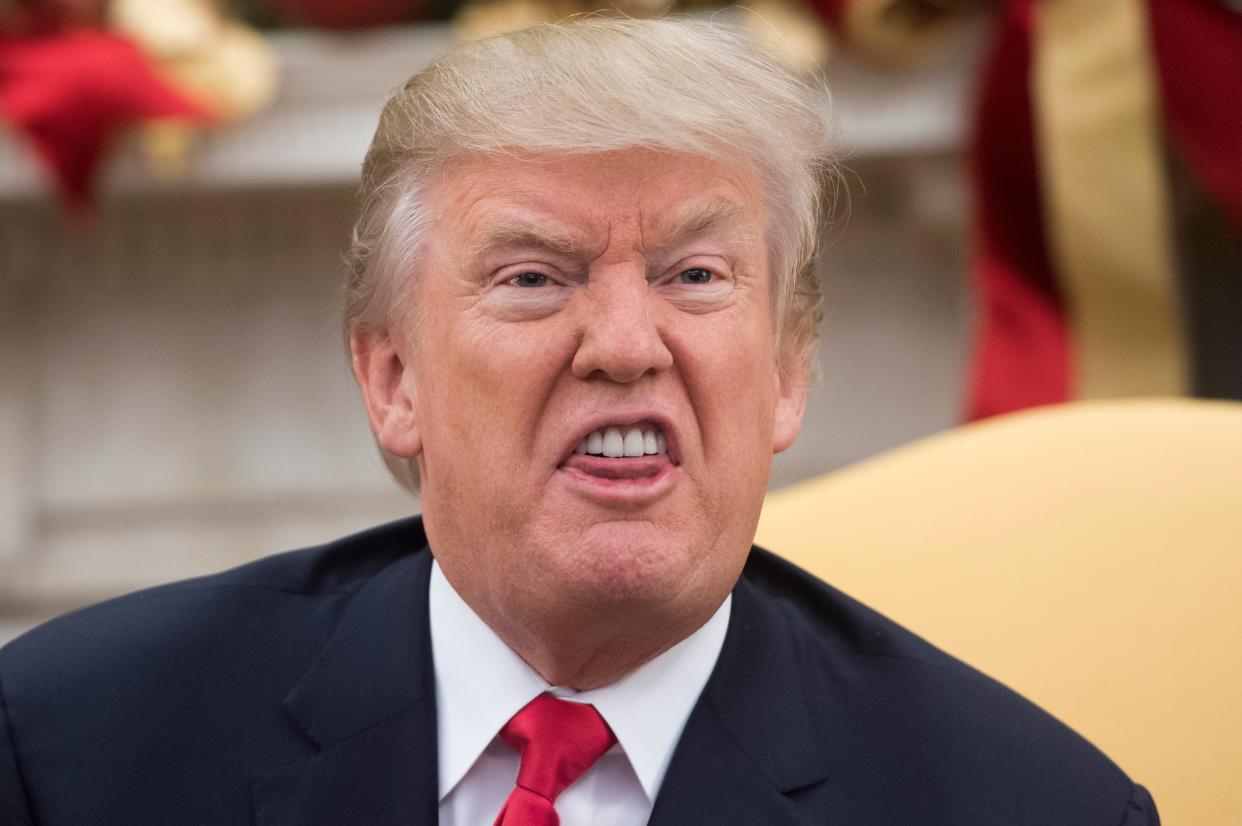Facebook could restrict the reach of Trump’s posts when he is no longer president

- Oops!Something went wrong.Please try again later.
President Donald Trump’s posts on Facebook will be fact-checked when he leaves office in January.
The new rules would mean that the reach of his posts could be limited if he posts false claims or misinformation. In the past, Facebook has suggested that Mr Trump’s posts have been protected because of his status as president.
Facebook CEO Mark Zuckerberg has repeatedly said that it is not Facebook’s place to fact-check political speech. He criticized Twitter as the “arbiters of truth” following the app correctly labelling the president’s posts about a rigged 2020 presidential election as false.
The social media giant has also staunchly said that it will not check political advertisements, despite the potential those would have to spread misinformation and disinformation.
Moreover, Facebook currently has policies that exempt Mr Trump from the consequences of his posts due to the ‘newsworthiness’ of his political position. Twitter has similar conditions in place, despite Mr Trump repeatedly breaking their rules.
“A handful of times a year, we leave up content that would otherwise violate our policies if the public interest value outweighs the risk of harm. Often, seeing speech from politicians is in the public interest, and in the same way that news outlets will report what a politician says, we think people should generally be able to see it for themselves on our platforms”, Zuckerberg posted in June.
“We will soon start labeling some of the content we leave up because it is deemed newsworthy, so people can know when this is the case”, he continued.
“We'll allow people to share this content to condemn it, just like we do with other problematic content, because this is an important part of how we discuss what's acceptable in our society -- but we'll add a prompt to tell people that the content they're sharing may violate our policies.”
Currently, Facebook’s labels on Mr Trump’s content has not supressed his ability to spread misinformation.
Donald Trump is the biggest source of coronavirus misinformation, and his posts falsely alleging election interference were Facebook’s most popular posts.
Facebook adds information labels to Mr Trump’s posts in order to try and direct viewers to factual information. These have reportedly done little to stop their spread, according to comments posted on Facebook internal message boards.
“We have evidence that applying these informs to posts decreases their reshares by [approximately] 8 per cent,” one data scientist said.
“However given that Trump has SO many shares on any given post, the decrease is not going to change shares by orders of magnitude.”
The data scientist added that the labels were not expected to limit the scale of the post, but rather “to provide factual information in context to the post.”
However, when Mr Trump leaves the White House and is replaced by Joe Biden, he will no longer be exempt from such policies.
"Former candidates for office or former officials continue to be covered by our third-party fact-checking programme," Facebook policies state.
Should Mr Trump use his platform on Facebook to spread content that violates its codes of conduct, Facebook could also take action against his account.
"By and large, the vast majority of our policies have no newsworthiness or political exception, so if the president or anyone else is spreading hate speech or inciting violence or posting content that delegitimizes the election or valid forms of voting, those will receive the same treatment as anyone else saying those things, and that will continue to be the case," Zuckerberg said on Tuesday.
Twitter has also said that, when Mr Trump is no longer president, he could be banned from the platform.
“Twitter’s approach to world leaders, candidates, and public officials is based on the principle that people should be able to choose to see what their leaders are saying with clear context. This means that we may apply warnings and labels, and limit engagement to certain tweets. This policy framework applies to current world leaders and candidates for office, and not private citizens when they no longer hold these positions,” Twitter said.
Twitter CEO Jack Dorsey echoed similar sentiments to the senate commission: "If an account suddenly is not a world leader anymore, that particular policy goes away," Dorsey said.
Fact-checking the president could result in posts having reduced visibility, as well as warning users before they share the post that they could be spreading false information. Should the behaviour be repeated, Facebook could reduce Mr Trump’s visibility for every post.
The issues around content the president shares on Facebook have repeatedly caused issue for the social media site, with employees speaking out against what they perceive as immoral behaviour from the company.
The social media giant apparently fired an employee who had criticised Mark Zuckerberg's decision not to take action against inflammatory posts by Donald Trump in June.
Another senior Facebook engineer who collected evidence of the company providing preferential treatment to right-wing pages was reportedly fired by the company for breaking its “respectful communication policy” in August.
Read More
Facebook accused of ‘risking lives’ by forcing staff back to offices
Trump preparing to give up election results legal fight next month
Zuckerberg says Facebook execs expected Trump to falsely claim victory
Zuckerberg denies senator’s plea to remove Steve Bannon over threats

